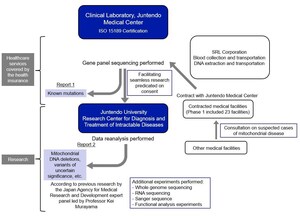Juntendo University Research: A New Combination Therapy is Effective in Treating a Rare Blood Cancer Cell Type
TOKYO, March 25, 2020 /PRNewswire/ -- In a collaborative study published in Blood Advances, a research group led by Beate Heissig at Juntendo University and Yousef Salama at An Najah University report a strategy to overcome drug resistance developed by blood cancer cells.
Multiple myeloma is an aggressive cancer affecting a specific type of white blood cells known as plasma cells. The primary challenge faced by oncologists in treating multiple myeloma is the tendency of the disease to recur after treatment or stop responding to treatment altogether. A team spanning across Juntendo University, the University of Tokyo, and An-Najah National University has now shown how a triad of proteins within cancerous plasma cells helps them grow uncontrollably and bypass the effects of cancer drugs.
The researchers first isolated affected blood cells from patients at various stages of the cancer. Incidentally, the cells of all these patients had one thing in common—an increased presence of Egfl7, a protein that promotes cell growth. As expected, when Egfl7 levels were reduced within the cells, the cells started dying. Egfl7 was thus instrumental in helping the cancer cells grow. The proliferation of cancer cells requires Itgb3, a protein that coincidentally also acts as a partner of Egfl7. When the blood cells were further analyzed, indeed it was found that the two proteins latched onto each other and led to the survival of plasma cells.
The plasma cells of patients that do not respond to drugs hide in the blood-making niche, the bone marrow. But for a chemotherapeutic drug to work, cells need to proliferate. This prompted the group to investigate whether Egfl7 and Itgb3 were the culprits driving drug resistance. To assess this theory, cancerous plasma cells were treated with the anti-cancer drug bortezomib. Cells treated with higher doses of bortezomib did in fact have excessive levels of Egfl7 and Igtb3, making them more prone to hide out in the bone marrow and evade chemotherapy. This was accompanied by enhanced survival, proving that the cancer had become insensitive to bortezomib. However, upon blocking Egfl7 and Igtb3 the cells began responding to bortezomib again. Lastly, it was also noted that the teaming up of Egfl7 and Igtb3 led to the activation of a third perpetrator—Klf2. Klf2 in turn further enhanced Egfl7 levels, setting into motion a vicious cycle that kept tumor cells alive.
"Chemotherapeutic drugs are more effective when combined with drugs against Egfl7, thereby interrupting the vicious cycle," said the reseachers. What's more, Egfl7-blockers when used in combination with chemotherapeutic drugs can enhance the effects of the latter especially in patients that are resistant to or do not respond well to chemotherapy. "In the present study, we provide functional evidence that the Egfl7-Itgb3-Klf2 axis regulates [multiple myeloma] cell growth and contributes to [bortezomib] resistance," conclude the researchers. Blocking Egfl7 and its partners could be a promising strategy in not only preventing the growth of cancerous blood cells but also preventing resistance to existing chemotherapies.
Background:
Plasma cells: Plasma cells are a type of white blood cells which are produced in the bone marrow and subsequently transported into the blood. These cells help the body ward off infections by battling pathogens. In multiple myeloma, the plasma cells turn cancerous increasing the susceptibility of patients to infections and weakening their immune system. Plasma cells are also known to evade chemotherapy drugs especially at later stages of disease and thus continue to grow exponentially, resulting in disease progression. This makes the treatment of multiple myeloma particularly challenging.
Reference
Yousef Salama, Andries Hendrik Heida, Kazuaki Yokoyama, Satoshi Takahashi, Koichi Hattori, Beate Heissig. The Egfl7-Itgb3-Klf2 axis enhances myeloma cell survival and contributes to drug resistance. Blood Advances, Vol. 4; 1021-1037, 2020. DOI 10.1182/bloodadvances.2019001002.
Further information about Juntendo University
Mission Statement
The mission of Juntendo University is to strive for advances in society through education, research, and healthcare, guided by the motto "Jin – I exist as you exist" and the principle of "Fudan Zenshin - Continuously Moving Forward". The spirit of "Jin", which is the ideal of all those who gather at Juntendo University, entails being kind and considerate of others. The principle of "Fudan Zenshin" conveys the belief of the founders that education and research activities will only flourish in an environment of free competition. Our academic environment enables us to educate outstanding students to become healthcare professionals patients can believe in, scientists capable of innovative discoveries and inventions, and global citizens ready to serve society.
History of Juntendo University
Juntendo was originally founded in 1838 as a Dutch School of Medicine at a time when Western medical education was not yet embedded as a normal part of Japanese society. With the creation of Juntendo, the founders hoped to create a place where people could come together with the shared goal of helping society through the powers of medical education and practices. Their aspirations led to the establishment of Juntendo Hospital, the first private hospital in Japan. Through the years the institution's experience and perspective as an institution of higher education and a place of clinical practice has enabled Juntendo University to play an integral role in the shaping of Japanese medical education and practices. Along the way the focus of the institution has also expanded, now consisting of four undergraduate programs and three graduate programs, the university specializes in the fields of health and sports science and nursing health care and sciences, as well as medicine. Today, Juntendo University continues to pursue innovative approaches to international level education and research with the goal of applying the results to society.
Further information
Juntendo University
2-1-1, Hongo, Bunkyo-ku, Tokyo 113-8421 JAPAN
E-mail: [email protected]
Website: http://www.juntendo.ac.jp/english/
Research: https://www.juntendo.ac.jp/english/research.html
SOURCE Juntendo University

WANT YOUR COMPANY'S NEWS FEATURED ON PRNEWSWIRE.COM?
Newsrooms &
Influencers
Digital Media
Outlets
Journalists
Opted In





Share this article